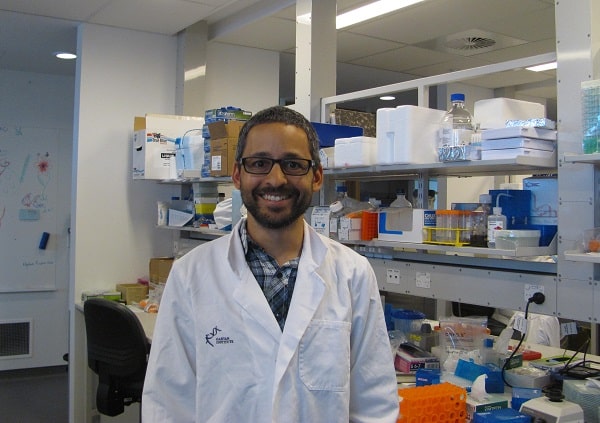
While we might think of breast cancer as being one type of cancer, there are in fact many variations, with some easier to detect and treat than others. A highly aggressive form of the disease known as triple negative breast cancer is particularly nasty since it is difficult to detect and results in less chance of survival.
Dr Simon Junankar and his colleagues at the Garvan Institute have discovered that these differential outcomes are determined by different cell types – stem cells for the aggressive form of breast cancer, and specialised cells for benign tumours.
Located in Sydney’s Darlinghurst, for over 50 years the world renowned Garvan Institute of Medical Research has undertaken research to improve our health by developing ways of preventing, treating and curing diseases including cancer, diabetes, obesity, osteoporosis, immunological diseases such as asthma and neurological diseases including Alzheimer’s and Parkinson’s disease.
After graduating from the Australian National University, Canberra with a Bachelor of Science (Hons) in 2000, Dr Simon Junankar completed his PhD and commenced research at the Garvan Institute focusing on the interactions between cancer and the immune system and how immune cells can stimulate the growth of cancerous tumours.
Stem cells share many of the same characteristics as cancers. They are plastic and flexible, and have the ability to rapidly multiply and spread into other body tissue – deadly traits in cancers. What Dr Junankar and his colleagues found is that a gene known as ‘inhibitor of differentiation 4’ (ID4) determines whether a stem cell remains a stem cell or whether it differentiates into a specialist cell.
Now, Dr Junankar and his team are trying to create an inhibitor of this protein to block the stem cells, and thereby the growth of this highly aggressive form of breast cancer, by stimulating the growth of specialised cells. If this were possible, women diagnosed with aggressive breast cancers may be able to be better treated.
Born in England, Dr Junankar moved to Canberra when he was 10 years old. He was introduced to biochemistry at a young age through his mother who was a biochemist.
“It wasn’t until I started studying at university that I really developed a strong interest for molecular biology and medical research,” Dr Junankar says.

After completing his undergraduate degree, he spent time working at the University of California, San Francisco (UCSF).
“The level of infrastructure at the Garvan is quite high and is similar to what was available at UCSF,” he says. “However, in the US there is a lot more support for the junior researchers who obtain faculty positions, where universities in the US usually give their new faculty significant funding to help them establish their labs.”
Dr Junankar believes this is in part due to the larger pool of philanthropic funds that universities receive in the US.
“Work undertaken at the Garvan Institute has led to important scientific breakthroughs and yet the research that we are undertaking is dependent upon federal government grants to allow the research to continue, and this falls far short,” Dr Junankar says. “For every dollar received, the Garvan Institute requires another 70 cents to cover operating costs.”
Speaking on the challenges of funding research work, Junankar says it is a “constant battle” to find the funds to support his research. Grants from the National Health and Medical Research Council, the main source of federal government funding, are becoming harder and harder to obtain – particularly for younger researchers.
“Last year less than 15 percent of project grant applications were funded,” he says. “And not because their projects were unworthy of support!”
Dr Junankar credits two people in particular who have been instrumental in his career, Prof. Lisa Coussens at UCSF (now at Oregon Health and Science University) and Dr Alexander Swarbrick at the Garvan Institute. It was Prof. Coussens who introduced him to tumour immunology, and the double-edged sword the immune system plays in the biology of cancers, where the immune system can both help tumours grow as well as be activated to eliminate the tumour.
“She has also continued to mentor me and support my career in the years since leaving her lab,” Dr Junankar says.

His second mentor, Dr Swarbrick has given him the opportunity to pursue his own ideas, and develop his own research direction within his laboratory. “He is also very engaged in my research and regularly provides insightful advice,” Dr Junankar continues.
As well as advocating self-examination, and being aware of any unusual changes, Junankar advocates women have regular mammograms. “BreastScreen Australia provides a mammogram every two years at no charge for women aged 50-74. This is the most effective way of detecting any abnormality,” he says.
“All of us have been touched by someone we know succumbing to a major illness that we are researching, whether it is cancer or some other disease,” Dr Junankar says.

The Garvan Foundation provides support to the Institute and helps scientists to continue contributing to knowledge which will ultimately lead to earlier diagnosis, better disease management, new therapies and prevention or cure of a range of diseases. “We find that a donation is a meaningful way to remember that person, but there are other ways that people can become engaged. Young Garvan, for instance, provides lectures and the opportunity to connect with like-minded people.”
The Garvan Institute offers guided tours and seminars on a range of health issues, aiming to broaden our understanding of disease prevention and treatment, and providing updates on the research currently being undertaken.
Visit http://www.garvan.org.au/ or phone 9295 8299
To make a BreastScreen appointment at a centre near you, phone 132 050




